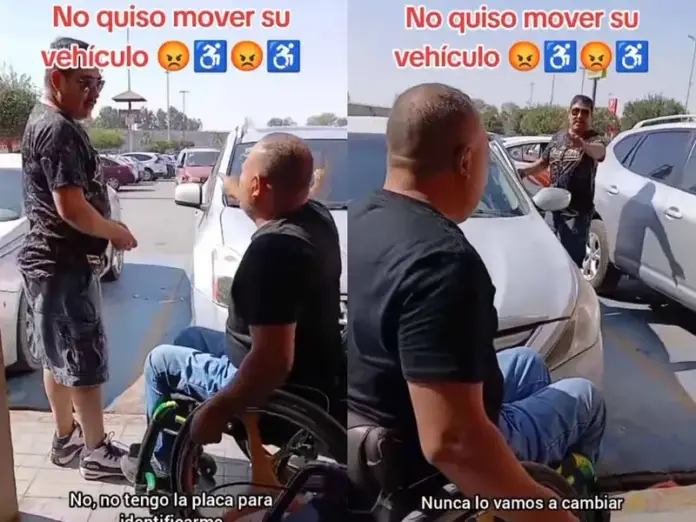A video shared on social media has sparked outrage after showing a man parking his vehicle in a space reserved for people with disabilities in the city of Gómez Palacio, Durango. The driver’s response was not only surprising, but also sparked mockery and criticism, as he sarcastically stated, “We’re in Mexico.”
The incident occurred on the afternoon of Monday, April 28, at a shopping center located in the Hamburgo neighborhood. Fernando García, a member of the State Council for the Development of People with Disabilities in Durango, recorded and published the footage showing the driver leaving his vehicle in a space that, according to the license plate, is not his.
Despite being pointed out by those present, the man reacted with indifference and responded, “We’re in Mexico, and we’re never going to change that.” He then ignored those who confronted him and drove away, leaving his car in the space reserved for people with disabilities.
In the video, Fernando García denounces that these types of situations are common in the region, largely due to the lack of effective sanctions by traffic authorities. “There is no punishment, therefore there is no respect,” he noted.
The images have generated a stir on social media, where users have already begun searching for the person responsible for this violation.
What is the fine for parking in a disabled space in Durango?
In Durango, parking in a space reserved for people with disabilities without the proper permits can result in a fine of 35 UMAs, equivalent to approximately $3,959.90 pesos in 2025. Furthermore, this violation cannot be discounted, even if paid promptly.
These spaces are essential to ensuring safe and adequate mobility for those who need them, which is why authorities are seeking to raise community awareness about their importance.
Mexico and the Mobility Problem for People with Disabilities
In Mexico, people with disabilities face significant mobility challenges due to a lack of adequate infrastructure, accessible transportation, and inclusive policies. According to the National Discrimination Survey (ENADIS), 31.1% of people with disabilities identify inadequate streets, facilities, and transportation as their main problem. Furthermore, regional inequality exacerbates the situation, especially in the south of the country, where educational and employment opportunities are more limited.
Although efforts have been made to improve accessibility, such as implementing public policies and promoting labor inclusion, much remains to be done. For example, ensuring universal accessibility in public transportation and adapting urban infrastructure are essential steps to improve the quality of life for this population.
:quality(75)//media/inside-the-note/pictures/2025/04/29/hombre-estaciona-espacio-discapacitados-durango-indignacion_dos.jpeg)
Source: excelsior




